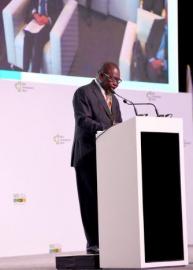
Minister of Finance Enoch Godongwana has called for visible thought leadership on how the New Development Bank (NDB) can play a more catalytic role in the achievement of Sustainable Development Goals (SDGs) in developing and emerging markets.
The SDGs are a universal call to action to end poverty, protect the planet, and ensure that by 2030 all people enjoy peace and prosperity.
“The Bank must be unwavering in its commitment to the SDGs as it remains the most relevant benchmark for the development priorities of developing countries. Therefore, as we grow and strengthen the NDB as an institution, we must not lose sight of its developmental mandate.
“There is a need to address global challenges such as geopolitical challenges, which impacts multilateralism, escalating climate stresses, widening economic and social divides, and challenges we face at a national level.
“This includes poverty, inequality, and unemployment that continue to plague our societies,” Godongwana said on Friday. The Minister was addressing the NDB Annual meeting in Cape Town.
The Minister noted the significant progress that has been made by the Bank since being operational.
“[However], we must recognise that there is still much work to be done. As the 2030 Agenda draws near, increased momentum towards achieving the SDGs is imperative. This is a critical time for global development partners to come together and convey a strong message on the broad development agenda,” he said.
The Minister said progress on the SDGs will require targeted investment.
“Access to concessional development finance for developing countries is imperative to ensure accelerated progress in addressing development challenges and achieving inclusive growth that creates economic opportunities for all.
“In addition, there is a need for sizeable increases and greater stability in the flow of private capital investments. The NDB can play an essential role in mobilising private investment and ensuring it flows where it is needed most.
“The Bank must implement innovative financing instruments to crowd-in private sector participation. This should be accompanied by technology transfer and capacity building support as multidimensional enablers to accelerate the implementation of the SDGs, especially in key areas such as renewable energy, infrastructure development, digital access and job creation,” Godongwana said.
He said investment in infrastructure is central to the achievement of the development goals.
“Infrastructure is an enormous economic multiplier, providing dividends for an economy long after the infrastructure has been built. We believe that the NDB’s activities in developing and emerging markets will assist in addressing the large infrastructure financing gap that has been impeding economic growth and development, particularly in Africa.
“In this slow growth environment, where fiscal and monetary policy is limited, public and private role players need to collaborate to support growth.
“To this end, we look to the NDB to provide solutions aimed at de-risking infrastructure projects through its financial instruments to attract private capital,” the Minister said.
This will support infrastructure projects and provide technical assistance in designing innovative funding models and institutional arrangements that could accelerate infrastructure investments at a country-level.
“However, if the Bank is to continue advancing the interests of the developing world and address challenges such as renewable energy, infrastructure development, digital access and job creation then NDB must make a concerted effort to speed-up disbursements of approved projects.
“As more African countries become members of the NDB we believe that the Bank can play a very instrumental role in the provision of infrastructure and addressing its infrastructure deficit,” he said. -SAnews.gov.za


